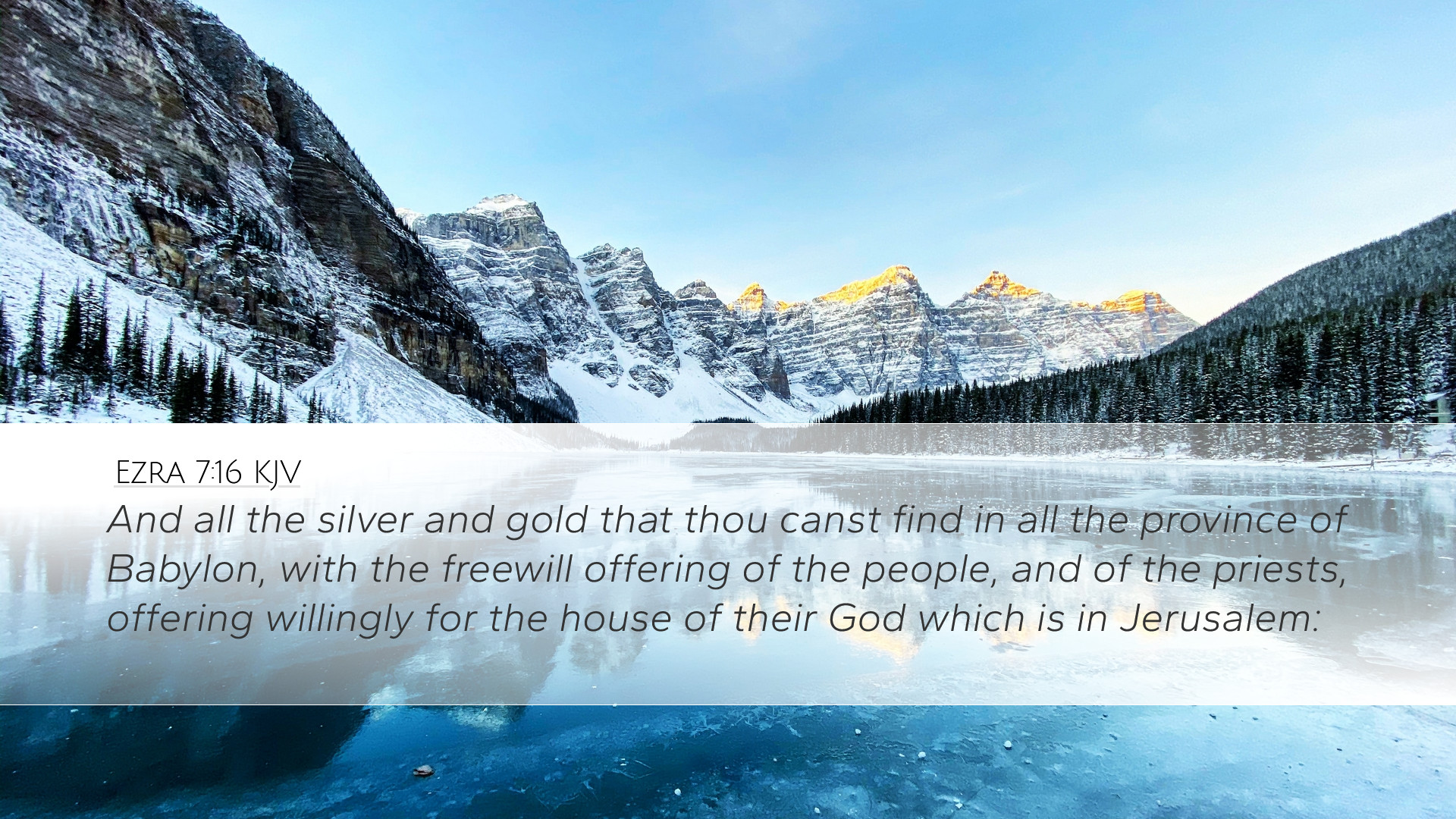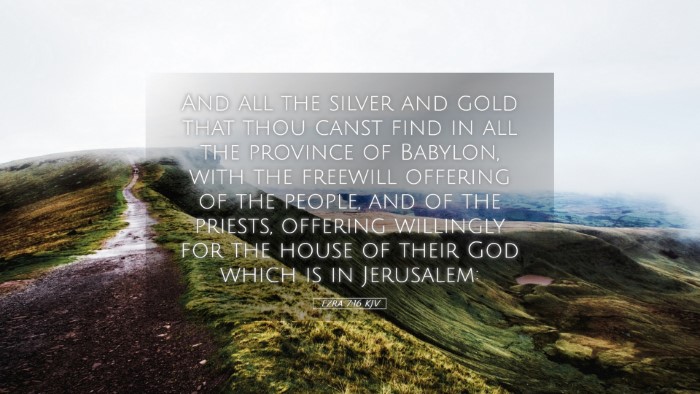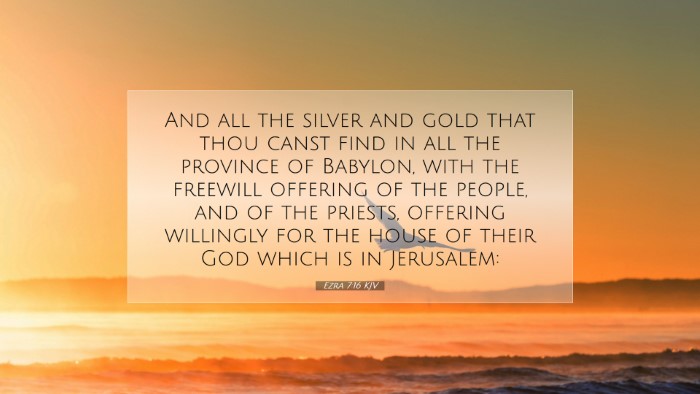Old Testament
Genesis Exodus Leviticus Numbers Deuteronomy Joshua Judges Ruth 1 Samuel 2 Samuel 1 Kings 2 Kings 1 Chronicles 2 Chronicles Ezra Nehemiah Esther Job Psalms Proverbs Ecclesiastes Song of Solomon Isaiah Jeremiah Lamentations Ezekiel Daniel Hosea Joel Amos Obadiah Jonah Micah Nahum Habakkuk Zephaniah Haggai Zechariah MalachiEzra 7:16
Ezra 7:16 KJV
And all the silver and gold that thou canst find in all the province of Babylon, with the freewill offering of the people, and of the priests, offering willingly for the house of their God which is in Jerusalem:
Ezra 7:16 Bible Commentary
Commentary on Ezra 7:16
Ezra 7:16 is a pivotal verse in the narrative of Ezra's return to Jerusalem. In this verse, Ezra is given the authority and resources to perform his sacred duties, highlighting the themes of divine provision, leadership, and restoration of worship among the returned exiles. The verse reads: "And thou shalt send the silver and gold, which the king and his counselors have freely offered unto the God of Israel, whose habitation is in Jerusalem."
Contextual Overview
This passage is situated within the larger narrative of the post-exilic era, where the Israelites are returning to their homeland after the Babylonian captivity. Ezra, identified as a scribe and a priest, plays a crucial role in re-establishing the Jewish community in Jerusalem. The issuance of a decree by King Artaxerxes providing Ezra with resources is significant as it marks a step towards restoration of God’s people and worship in Jerusalem.
Theological Insights
- Divine Mandate: The sending of silver and gold to support the temple worship underscores God's sovereignty and His care for the worship of His people. The king's decree reflects God's providence in using foreign kings to fulfill His purposes.
- Preparation for Worship: The financial provisions symbolize the importance of preparation for worship. This act of giving willingly from the king and his counselors also serves as an invitation for others to participate in the rebuilding of the community's spiritual foundation.
- Community Involvement: The collaboration between secular authority and religious responsibility suggests a holistic approach to community rebuilding. It invites a dialogue between faith and governance.
Commentary Excerpts
Matthew Henry
Matthew Henry emphasizes Ezra's role as a leader who not only receives authority but also seeks the welfare of his people. He notes that the assistance from the king emphasizes a divine orchestration, as God moves the hearts of rulers to favor His people. Henry highlights the significance of the outward support provided to enhance the worship of God, interpreting it as a direct blessing upon the work of Ezra.
Albert Barnes
Albert Barnes views this provision as a symbol of transition for the Jewish nation from captivity back to their religious roots. He interprets the gifts as a means to restore the dignity of the temple and the religious practices. Barnes notes that the text encourages individuals to recognize the importance of supporting the house of God for the continuation of devotion among His people, thus reinforcing communal identity through worship.
Adam Clarke
Adam Clarke delves into the practical implications of sending silver and gold. He interprets it as an encouragement for the people to contribute to the temple’s reconstruction, reflecting the heart of worship which involves personal investment. Clarke also raises a significant point regarding the "freewill offering" aspect of the gifts, connecting it with the New Testament principle of cheerful giving, pertinent to believers today.
Practical Applications
The insights drawn from Ezra 7:16 can be particularly meaningful for pastors, students, theologians, and scholars in various ways:
- Spiritual Leadership: Leaders in the church can learn from Ezra's example of seeking God’s plan and acting on behalf of the community. It encourages a model of servant leadership.
- Resource Allocation: This verse can inform discussions on financial stewardship within the church, highlighting the importance of allocating resources for the advancement of worship and community initiatives.
- Encouragement of Generosity: The concept of freewill offerings can inspire congregations to engage in acts of generosity, supporting not just local church needs but also broader initiatives to spread the gospel.
- Worship Redefined: Reflecting on the significance of the worship environment can lead to fresh perspectives on how modern-day worship spaces and practices can be enhanced to foster deeper connections among believers.
Conclusion
Ezra 7:16 serves as a reminder of God's unwavering commitment to His people and His work. The support provided from unexpected sources demonstrates how divine plans unfold through human actions. As modern readers grapple with the implications of this verse, it inspires both individual and communal reflection on the nature of worship, stewardship, and community in the light of God's ongoing redemptive work.


